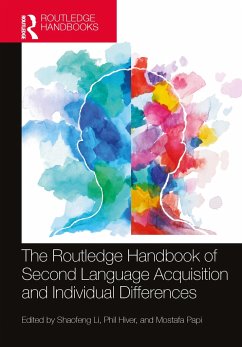
The Routledge Handbook of Second Language Acquisition and Individual Differences
Versandkostenfrei!
Versandfertig in 6-10 Tagen
49,99 €
inkl. MwSt.

PAYBACK Punkte
25 °P sammeln!
The Routledge Handbook of Second Language Acquisition and Individual Differences provides a thorough, in-depth discussion of the theory, research, and pedagogy pertaining to the role individual difference (ID) factors play in second language acquisition (SLA).It goes beyond the traditional repertoire and includes 32 chapters covering a full spectrum of topics on learners' cognitive, conative, affective, and demographic/sociocultural variation. The volume examines IDs from two perspectives: one is how each ID variable is associated with learning behaviors, processes, and outcomes; the other is ...
The Routledge Handbook of Second Language Acquisition and Individual Differences provides a thorough, in-depth discussion of the theory, research, and pedagogy pertaining to the role individual difference (ID) factors play in second language acquisition (SLA).
It goes beyond the traditional repertoire and includes 32 chapters covering a full spectrum of topics on learners' cognitive, conative, affective, and demographic/sociocultural variation. The volume examines IDs from two perspectives: one is how each ID variable is associated with learning behaviors, processes, and outcomes; the other is how each domain of SLA, such as vocabulary or reading, is affected by clusters of ID variables. The volume also includes a section on the common methods used in ID research, including data elicitation instruments such as surveys, interviews, and psychometric testing, as well as methods of data analysis such as structural equation modeling.
The book is a must-read for anysecond language researcher or applied linguist interested in investigating the effects of IDs on language learning, and for any educator interested in taking account of learners' individual differences to maximize the effects of second language instruction.
It goes beyond the traditional repertoire and includes 32 chapters covering a full spectrum of topics on learners' cognitive, conative, affective, and demographic/sociocultural variation. The volume examines IDs from two perspectives: one is how each ID variable is associated with learning behaviors, processes, and outcomes; the other is how each domain of SLA, such as vocabulary or reading, is affected by clusters of ID variables. The volume also includes a section on the common methods used in ID research, including data elicitation instruments such as surveys, interviews, and psychometric testing, as well as methods of data analysis such as structural equation modeling.
The book is a must-read for anysecond language researcher or applied linguist interested in investigating the effects of IDs on language learning, and for any educator interested in taking account of learners' individual differences to maximize the effects of second language instruction.














